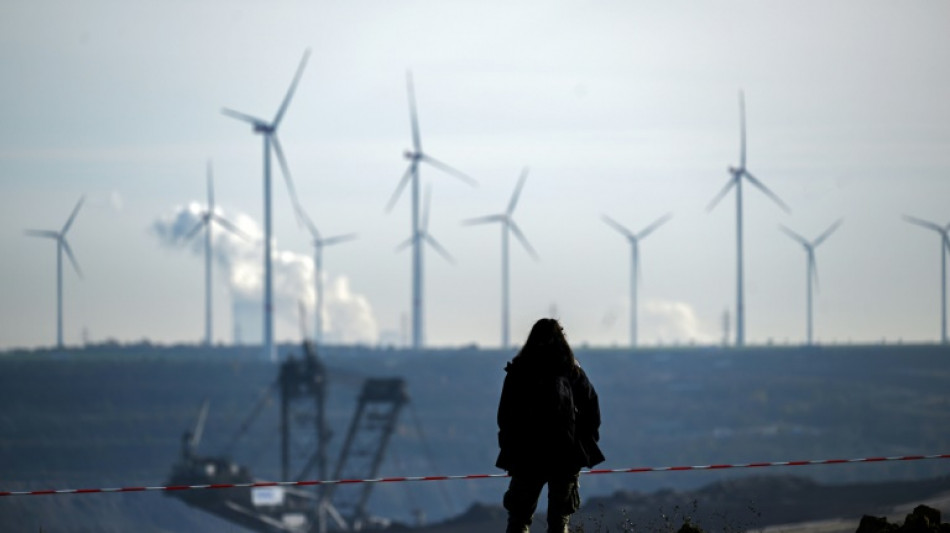
-
 Late Guirassy winner for Dortmund trims Bayern's lead atop Bundesliga
Late Guirassy winner for Dortmund trims Bayern's lead atop Bundesliga
-
'Free the mountains!": protest in Milan over Winter Olympics

-
 Gyokeres double helps Arsenal stretch Premier League lead
Gyokeres double helps Arsenal stretch Premier League lead
-
Six Nations misery for Townsend as Italy beat sorry Scotland

-
 Spain, Portugal face fresh storms, torrential rain
Spain, Portugal face fresh storms, torrential rain
-
Opinions of Zuckerberg hang over social media addiction trial jury selection

-
 Over 2,200 IS detainees transferred to Iraq from Syria: Iraqi official
Over 2,200 IS detainees transferred to Iraq from Syria: Iraqi official
-
Norway's Ruud tops Olympic men's freeski slopestyle qualifying

-
 Czech qualifier Bejlek claims first title in Abu Dhabi
Czech qualifier Bejlek claims first title in Abu Dhabi
-
French duo reach Shanghai, completing year-and-a-half walk

-
 Australian snowboarder James eyes elusive Olympic gold
Australian snowboarder James eyes elusive Olympic gold
-
Sequins and snow: Eva Adamczykova makes Olympic return

-
 Vonn set for Olympic medal bid after successful downhill training
Vonn set for Olympic medal bid after successful downhill training
-
Shepherd takes hat-trick as West Indies beat Scotland in T20 World Cup

-
 Sausages will sell after thrill-seeker Von Allmen wins Olympic downhill
Sausages will sell after thrill-seeker Von Allmen wins Olympic downhill
-
Swiss racer Von Allmen wins first gold of Winter Olympics

-
 'Wake up': Mum sparks comeback after scare for freeski star Gu
'Wake up': Mum sparks comeback after scare for freeski star Gu
-
Von Allmen wins men's Olympic downhill gold, first of Games

-
 First medals up for grabs at Winter Olympics
First medals up for grabs at Winter Olympics
-
Afghanistan captain Khan harbours dream of playing in Kabul

-
 Lindsey Vonn completes second Winter Olympics downhill training run
Lindsey Vonn completes second Winter Olympics downhill training run
-
Freeski star Gu survives major scare in Olympic slopestyle

-
 Iran FM looks to more nuclear talks, but warns US
Iran FM looks to more nuclear talks, but warns US
-
Hetmyer's six-hitting steers West Indies to 182-5 against Scotland

-
 After boos for Vance, IOC says it hopes for 'fair play'
After boos for Vance, IOC says it hopes for 'fair play'
-
Thousands gather as Pakistan buries victims of mosque suicide attack

-
 Lindsey Vonn completes second downhill training session
Lindsey Vonn completes second downhill training session
-
US pressing Ukraine and Russia to end war by June, Zelensky says

-
 Faheem blitz sees Pakistan avoid Netherlands shock at T20 World Cup
Faheem blitz sees Pakistan avoid Netherlands shock at T20 World Cup
-
Takaichi talks tough on immigration on eve of vote

-
 England's Salt passed fit for T20 World Cup opener
England's Salt passed fit for T20 World Cup opener
-
Spain, Portugal brace for fresh storm after flood deaths

-
 Pakistan bowl out Netherlands for 147 in T20 World Cup opener
Pakistan bowl out Netherlands for 147 in T20 World Cup opener
-
Pushed to margins, women vanish from Bangladesh's political arena

-
 Crypto firm accidentally sends $40 bn in bitcoin to users
Crypto firm accidentally sends $40 bn in bitcoin to users
-
Pistons end Knicks' NBA winning streak, Celtics edge Heat

-
 Funerals for victims of suicide blast at Islamabad mosque that killed at least 31
Funerals for victims of suicide blast at Islamabad mosque that killed at least 31
-
A tale of two villages: Cambodians lament Thailand's border gains

-
 Police identify suspect in disappearance of Australian boy
Police identify suspect in disappearance of Australian boy
-
Cuba adopts urgent measures to address energy crisis: minister

-
 Not-so-American football: the Super Bowl's overseas stars
Not-so-American football: the Super Bowl's overseas stars
-
Trump says US talks with Iran 'very good,' more negotiations expected

-
 Trump administration re-approves twice-banned pesticide
Trump administration re-approves twice-banned pesticide
-
Hisatsune leads Matsuyama at Phoenix Open as Scheffler makes cut

-
 Beyond the QBs: 5 Super Bowl players to watch
Beyond the QBs: 5 Super Bowl players to watch
-
Grass v artificial turf: Super Bowl players speak out

-
 Police warn Sydney protesters ahead of Israeli president's visit
Police warn Sydney protesters ahead of Israeli president's visit
-
Simi Khanna Launches Simi Beauty SK: A Natural Skincare Line Blending Luxury, Wellness, and Purpose

-
 Best Gold IRA Companies February 2026 Announced (Top Gold-backed IRA Companies Revealed)
Best Gold IRA Companies February 2026 Announced (Top Gold-backed IRA Companies Revealed)
-
Bolivia wants closer US ties, without alienating China: minister


Not nothing, not enough: is the Paris Agreement working?
Climate cooperation is facing a reckoning. Ten years after the landmark Paris Agreement, major polluters are wavering on action while the world fast approaches the deal's safer warming limit.
With climate change already causing dangerous extremes across the planet, a United Nations-led system based on consensus and pledges faces tough questions.
Has climate diplomacy done enough so far? And can it survive in an era of fracturing global alliances and economic uncertainty?
The challenge for this year's COP30 UN climate summit in Brazil, and beyond, is taking promises already made and putting them into action.
Instead, US President Donald Trump is yanking the world's second biggest greenhouse gas emitter out of the Paris Agreement for a second time.
The United States and other major producing countries are planning to extract even more coal, oil, and gas, despite a 2023 UN climate agreement to "transition away" from fossil fuels.
The European Union missed a key UN deadline to submit its climate plans, while number-one polluter China low-balled its target.
Former UN climate chief Patricia Espinosa said COP summits were still "absolutely necessary" to unite countries and hold them accountable for their action -- or inaction.
"I don't think there's any other way to address a threat to humanity as big as this is," she told AFP at recent climate talks in Germany.
Though imperfect, she said, the COPs have "delivered a very clear blueprint on what we need to do".
- 'Admit failure' -
The centrepiece of the Paris Agreement, negotiated in 2015, was the commitment to keep average temperature rises "well below" 2C since pre-industrial levels -- and preferably the safer level of 1.5C.
For frontline countries, like Pacific Island nations threatened by rising sea levels, 1.5C is not a number but a matter of "survival", said Tuvalu's climate minister Maina Talia.
"Ten years after the Paris Agreement and we are still trying to lobby," he told AFP, adding that backtracking by polluters was "very disheartening".
The UN says the deal has made a difference. Before Paris, the world was heading to 5C of warming by the end of the century, a trajectory now moderated to a still-catastrophic 3C.
Scientists say the long-term 1.5C limit will be breached in a matter of years. The world experienced its first year above 1.5C in 2024, and witnessed monster fires, floods and heatwaves.
"We must admit failure, failure to protect peoples and nations from unmanageable impacts of human-induced climate change," said Johan Rockstrom, director of the Potsdam Institute for Climate Impact Research, speaking at the UN in New York last month.
"But we don't have to keep failing."
- 'Clear the path' -
The Paris deal was not only about temperatures.
It consecrated a swathe of measures, including climate finance and resilience goals, to help those who are least responsible for warming but often hardest hit.
Observers say it has also pushed climate risk onto the mainstream economic agenda and driven countries to draw up national climate plans.
This year it formed a key part of the International Court of Justice's ruling recognising states' legal climate obligations.
Arguably the most significant development in efforts to curb climate change -- the vertiginous cost reductions of solar and wind power, batteries and electric vehicles -- was seeded long before Paris.
Building on innovations from Europe and America over many decades, China started taking the lead on renewables in the 2000s, likely motivated by its lack of domestic oil and gas supplies, said Kingsmill Bond of clean energy research group Ember.
Now those huge investments are paying off, with a vast domestic rollout amounting to 60 percent of the world's solar capacity added in 2024.
Europe, shaken by energy security fears after Russia's invasion of Ukraine, has also raced to wean itself off its fossil-fuel dependency.
And some developing countries have imported Chinese renewables so fast they have upended ideas of what an energy transition looks like.
Ember has termed this an "electrotech revolution", spurred as much by economic and energy security needs as climate concerns.
Nevertheless, Bond said the Paris deal had successfully focused policymakers' minds on the problems of a warming world.
But he said the UN process should now direct its attention to deploying solutions.
"We now have these new technologies. Let's clear the path," he said.
O.M.Souza--AMWN


